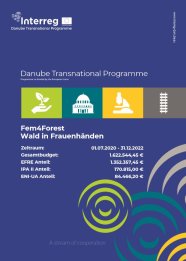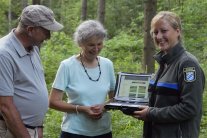Forschungs- und Innovationsprojekt
Fem4Forest - Wald in Frauenhänden
Das Interreg-Projekt Fem4Forest („Wald in Frauenhänden“) startete am 1. Juli 2020 mit 14 Partner-organisationen aus zehn Ländern des Donauraumes (Slowenien, Kroatien, Österreich, Deutschland, Bosnien und Herzegowina, Serbien, Rumänien, Tschechien, Bulgarien, Ukraine).
English version
The project Fem4Forest "Forests in Women's Hands" started in July 2020 and involves 14 partners from 10 countries (Slovenia, Croatia, Austria, Germany, Bosnia and Herzegovina, Serbia, Romania, Czech Republic, Bulgaria, Ukraine). The project is funded under the Interreg Danube Transnational Program. The leading partner is the Forestry Institute of Slovenia, and the project leader is Dr Nike Krajnc. In Bavaria the LWF will closely work together with the Community of interest Female Forest Owners, regional forest offices and other important stakeholders.
Within the Fem4Forest project, we will highlight different roles of women in forestry and more broadly, in forest supply chains. We will explore different possibilities for more active participation of women in forest management as well as in the labour market and in different levels of decision-making. Through a series of pilot projects in the Danube region, we aim to identify different possibilities for a more active role of women through the transfer of ideas and examples of good practice.
The main objective of Fem4Forest is to strengthen the forest sector at local, regional and interregional level through increased involvement and ability of women actors by supporting their equal presence and competences at the market in Danube region. The project offers a new and innovative approach to education and mentoring that will enable a more active role for women in the forestry sector.
On the basis of a comparative study and a selection of examples of good practice, we will present various employment opportunities for women in forestry in the participating countries. The planned activities are demand-driven and target three most crucial components: social inclusion, gender equality and economic independency. Due to multi-actor approach Fem4Forest has the genuine and strong involvement of target groups that will be engaged in various activities in order to voice their needs and co-create good practice examples. Thus, the Fem4Forest model (demand-based action plan, awareness campaign, mentoring and training program) for the integration of women will be developed. By addressing the problem of young and long-term unemployed women in rural areas, we will also contribute to a higher employment level in the Danube region in the long term.
In Bavaria almost half of the forest owners are women owning about 500,000 ha (20 % of the total forest area) either alone or in a collective property. In comparison to this high number of female forest owners the share of women as professionals in the forest based sector or boards of forest owner associations is comparatively low. As part of the project, we want to make the role of women in forestry in Bavaria more visible, offer new opportunities, show examples of good practice and, if interested, organize various forms of training and mentoring.
PROJECT ID:
TITLE: Forests in women‘s hands
Acronym: Fem4Forest
Project No.: DTP3-500-1.2 Fem4Forest
Start date: 1.07.2020 End date: 31.12.2022
Project budged: 1.6 million €
Partnership: 14 partners, from 10 countries (7 ERDF, 2 IPA, 1 ENI-UA)
Hintergrund und Ziele
 Zoombild vorhanden
Zoombild vorhanden
Abb. Projektposter
Das europäischen Verbundprojekt, dass im Dezember 2022 abgeschlossen wurde, hat unterschiedlichen Möglichkeiten für eine aktivere Beteiligung von Frauen an der Waldbewirtschaftung untersucht. In konkreten Pilotprojekten wurden außerdem Wege für eine aktivere Rolle von Frauen im Forstsektor aufgezeigt und anhand von Beispielen guter Praxis verallgemeinerbar dargestellt. Wichtige Komponenten bei allen Projektaktivitäten waren: soziale Inklusion, Geschlechtergerechtigkeit, Gleichstellung am Arbeitsmarkt. Die für das Projekt relevanten Zielgruppen wurden durchgehend einbezogen.
Die länderübergreifende Zusammenarbeit in dem Fem4Forest-Projekt hat solide Grundlagen geschaffen, innovative Ideen und Ansätze in der Kompetenzentwicklung für ländliche Räume befördert und neue Perspektiven für den Forstsektor eröffnet. Um eine aktivere Rolle von Frauen in der Forstwirtschaft zu gewährleisten, hat das Projekt einen besonderen Ansatz für Bildung und Mentoring verfolgt: Auf Grundlage einer umfassenden Studie zum Status von Frauen im Forstsektor, die die LWF geleitet hat, wurden für die einbezogenen Länder des Donauraums spezifische Entwicklungspfade zur Stärkung von Frauen im Forstsektor definiert, Handlungsempfehlungen formuliert und nachfrageorientierte Angebote umgesetzt.
Umsetzungen in Bayern:
- Informationstag für Waldbesitzerinnen am AELF Rosenheim am 23.09.2022
 997 KB
997 KB
- Veranstaltungsreihe für Frauen am AELF Cham „Die Waldbewirtschaftung im Lauf der Jahreszeiten“
 2,4 MB
2,4 MB
- Filmbeitrag zu Fem4Forest beim AELF Cham

- Veranstaltungsreihe für Frauen am AELF Abensberg-Landshut „Regionale Waldaktionstage für Frauen im Landkreis Kelheim“

- Gemeinsame Teilnahme am Schulungsprogramm „Transnational Mentoring Program“ von nowa und FAST Pichl (Österreich) mit Vertreterinnen der Bayerischen Forstverwaltung und Bayerischen Staatsforsten
 210 KB
210 KB
- Organisation des Bayerischen Forstfrauentreffens am 20./21.10.2022 mit Gleichstellungsbeauftragten von BaySF und Forstverwaltung
 163 KB
163 KB
- Handreichung für Mentoring von Berufseinsteigerinnen mit Försterinnen von BaySF und Forstverwaltung
 811 KB
811 KB
- Neuer Kurs bei Bayerische Waldbauernschule: „Frauenpower für den Wald“, Kursprogramm 2023, S. 16

Publikationen:
- Berufsbild „Frau Försterin“, AFZ – Der Wald 22/2022, S. 10-13

- Das Fem4Forest Projekt. Frauenpower für den Wald. Der Bayerische Waldbesitzer 1/2021, S. 20-21
 408 KB
408 KB
- Der Wald ist einfach wunderschön! Der Bayerische Waldbesitzer 3/2021, S. 24-25
 695 KB
695 KB
- Eine reine Männerdomäne? – Wald in Frauenhänden. Der Bayerische Waldbesitzer 2/2021, S. 20-21
 784 KB
784 KB
- Fem4Forest – Wald in Frauenhänden
 251 KB
251 KB
- LWF Merkblatt 51 - Waldbesitzerinnen in Bayern
- Same but different: How female forestry professionals experience their careers in countries of the Danube Region, Poster für All-IUFRO Konferenz, Wien, 23.09.2022
 1,9 MB
1,9 MB
- Umfrage im Donauraum. Waldbesitzerinnen im Faktencheck - Der Bayerische Waldbesitzer 1/2022, S. 30-31
 303 KB
303 KB
- Waldbesitzerinnen in Bayern und Österreich: Wachsendes Selbstbewusstsein in der „Männerdomäne Forst“, mit Dagmar Karisch-Gierer, Mein Wald Mein Holz 2/2022, S. 22-23
 343 KB
343 KB
- „Wir Frauen können das genauso“ – Der Bayerische Waldbesitzer, 4/2021, S. 32-33, mit Michaela Osti
 964 KB
964 KB
Projektberichte und Flyer:
- Fem4Forest Flyer (1): Informationen zum Projekt

- Fem4Forest Flyer (2): Was haben wir erreicht?

- Fem4Forest Flyer (3): Projektgesamtschau
 3,4 MB
3,4 MB
- FOREST IN WOMEN’S Hands (FEM4FOREST), Booklet Facts and figures regarding women in forestry in Danube Region, Deliverable D.C3.1, 25 Seiten

- FOREST IN WOMEN’S HANDS (FEM4FOREST), Report on Current situation and position of women in forestry in Danube region, Deliverable: D.T1.1.1, 297 Seiten

- FOREST IN WOMEN’S HANDS (FEM4FOREST) Report “Collected needs of women and wider gender perspectives in forestry”, Deliverable: D.T1.1.2, Oktober 2021, 50 Seiten

- Policy Brief: Försterinnen als Entscheiderinnen gewinnen
 350 KB
350 KB
Aktivierung erforderlich
Durch das Klicken auf diesen Text werden in Zukunft YouTube-Videos im gesamten Internetauftritt eingeblendet.Aus Datenschutzgründen weisen wir darauf hin, dass nach der dauerhaften Aktivierung Daten an YouTube übermittelt werden.
Auf unserer Seite zum Datenschutz erhalten Sie weitere Informationen und können diese Aktivierung wieder rückgängig machen.
Weitere Informationen finden Sie unter:
Projektinformationen
Projektleitung LWF: Roland Schreiber
Projektbearbeitung LWF: Dr. Kathrin Böhling
Projekt Leadpartner: Slowenisches Forstinstitut, Dr. Nike Krajnc
Laufzeit: 1. Juli 2020 bis 31. Dezember 2022
Durchführende Institutionen: Bayerische Landesanstalt für Wald und Forstwirtschaft und Slowenisches Forstinstitut
Finanzierung: 1,6 Mio. Euro, kofinanziert durch die Europäische Union via Interreg Donauraumprogramm
Förderkennzeichen: DTP3-500-1.2





